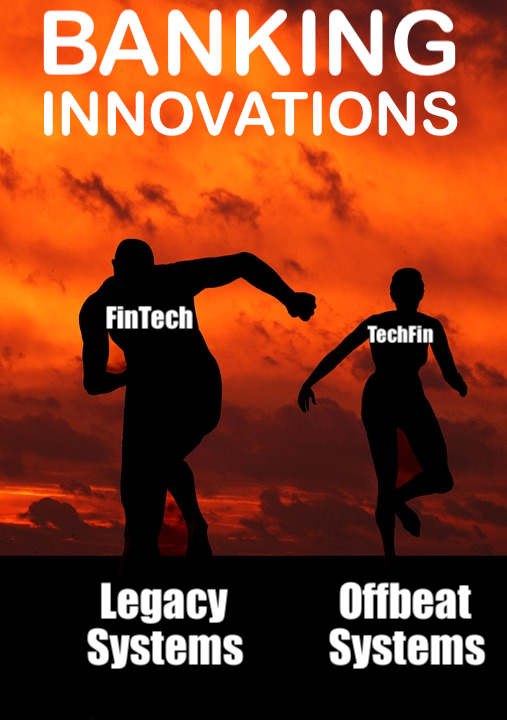Future Money: To Decentralize Or Not To Decentralize? (LXXXI)
MONEY is a claim on the Central Bank or a commercial bank! Will this change? Why? How and when? - Efi Pylarinou, Daily Fintech
The reason that money has been a claim on the central bank is simply because, the state-of-the-art so far just didn't provide means to do it any other way. That may not be the case anymore.

Since posting 6 back-to-back articles on "Ideal Money" in the beginning of this year, nothing really came to our notice that provoked another blog on money until Efi Pylarinou's recent post triggered the motivation.
The author essentially asks whether the centralized censored monetary system will in the future change to decentralized censorship resistant system? And, if it will, how, when and why?
It is interesting that while the article ends answering the "why," in favor of censorship resistance, but still puts forth a conflicting opinion of Professor Berensten for keeping the future money centralized within the censored control of central banks.
In "The Case for Central Bank Electronic Money and the Non-case for Central Bank Cryptocurrencies," he firmly believes that Central Bank electronic money would increase financial stability, claiming:
the key characteristics of cryptocurrencies are a red flag for central banks.
Let's look at these key characteristics de novo."
Let's look at these key characteristics de novo.
The Curious Case Of Decentralization
Decentralization is the process of distributing or dispersing functions, powers, people or things away from a central location or authority.
Here's an interesting take on decentralization:
Decentralization, self-governance and autonomy are integral parts of mother nature.
We never looked at nature this way before, but decentralized intelligence is indeed omnipresent in nature.
How else do we explain the countless examples of wonders of decentralized intelligence in nature, like murmuration of birds, formation flying, schools of fishes, ant colonies, animal herding, so on and so forth?


As much as we don't realize: "at the core of everything that makes life on this planet possible, is decentralized intelligence."
Can't deny the marvels of decentralized intelligence in divine nature. Indeed ……
"Decentralization is innate, divined and sustainable. Centralization is acquired, humanly, and perhaps less sustainable."

If Animals Can Do It, Why Can't Humans?
As far as decentralizing money is concerned, apart from the political will, the principle technological hurdle we see lies in the two schools of innovative thinking in the world of banking and finance:
FinTech & TechFin (TechFin is a new term explained herein).
https://medium.com/@drfazal/stm-the-beginning-of-the-end-of-legacy-banking-system-ad01f54c4e57
FinTech innovations work to innovate finance, but do it within a framework that protects and perpetuates the legacy of traditional brick and mortar banking systems. Fintech strives to bring consumers to legacy banking infrastructure.

In contrast, TechFin isn't bound by any legacy. It's primarily driven by technological possibilities in innovating "all things financial" any which way, making it purely a customer & technology centric approach.
Considering Fintech and TechFin at the two ends of the spectrum of currency innovation, will FinTech innovators give up their control over legacy banking systems and push central banks out of the equation? Not a chance.
The burden of tradition makes it too difficult for FinTech to innovate a digression from the convention.
Fintech innovators can never set their own legacy-dismantling ball rolling.
Decentralized Money Is A TechFin Goal
Professor Berentsen is an accomplished FinTech innovator and a legacy banking stakeholder, and not a TechFin radical. So obviously he will be prone to lean towards legacy banking's centralized monetary system.
From the perspective of the political will of the present day governments and the global economic control by legacy banking systems, his advise to "forget about a Fedcoin type of idea," and focus on "centralized electronic money," may be perfectly legitimate. From that perspective he may also be right when says:
"a central bank decentralized currency has no meaning at all."
But, does the technological rationalizations in support of his "centralized electronic money" hold enough water? Let's look at them one by one:
Slow Vs Fast
His argument against decentralized money revolves around a simplistic binary choice between
inefficient and slow censorship resistant bitcoin blockchain ( DLT) database,
versus,
fast centralized legacy system that's not censorship resistant.
When DLT is already approaching its fifth generation, looking at it with the slow and inefficient bitcoin glasses, is like choosing to ride a horse carriage in the age of supersonic flying machines.

And, moreover censorship resistance is just one of the many attributes of decentralization. There are others that may also triumph over legacy banking.
Anonymous Vs KYC / AML
In the same spirit, assuming that the decentralized nature of bitcoin transaction handling that enables users to remain anonymous and allows for permissionless access, makes KYC ("know your customer") and AML ("anti-money laundering") regulations impossible, is too short sighted. To conclude that blockchain can never evolve to a level of intelligence when the private/public keys can be linked to customers' KYC is grossly flawed even by today's state-of-the-art when biometric authentication is already becoming so pervasive that by the time a government sponsored cryptocurrency premiers almost of us would already be KYCed by default.
Blockchain ledgers are totally public and transparent to a level that each transaction is universally visible and identified via the transacting parties' encrypted public keys. In case of bitcoin, transactions are anonymous only because the bitcoin public keys do not identify the account owner by name. Just because total anonymity is a default feature of first generation blockchain (bitcoin), does that mean it is technologically impossible to design a blockchain intelligent enough to let the cryptocurrency issuer incorporate KYC as a wallet creating condition? On the contrary, blockchain ledgers are even better than legacy KYC systems.
As a matter of fact, our own ongoing KYC development performs better than any centralized legacy system approach by balancing the paradox of full regulatory accountability on one hand with public anonymity on the other.
Won't that make decentralized money a more effective approach than our current resource-intensive and often circumventable fiat money based AML regulations?
Bitcoin Is DLT, But All DLTs Aren't Bitcoin
Bitcoin is an asset belonging to a new asset class - cryptocurrencies, while blockchain is the technology platform that helps us create those cryptocurrencies. Is it fair to assign all the shortcomings of the first product of the first generation blockchain - bitcoin - to all the cryptocurrencies that can be created by new or future generation blockchains?
Currency Stability, Inflation & Reserves
Stability has never been an inherent function of fiat money per se. It's largely a consequence of the issuing country's economic strength. Dollar and Euro are stable not because of any collaterilization mechanism or backing by reserve assets, but because the economy of United States and Europe respectively are strong enough to enthuse confidence in consumers.
There is no currency in the world whose supply is fixed. A currency must expand along with the expansion of the economy it supports. To support growth, fiat money is and has to be inflationary with an ever expanding supply. If it doesn't it will become increasingly deflationary which is as unreliable a unit of account as an inflationary fiat currency.
It is not possible to maintain a 100% collateralized reserve system beyond a small, economically sovereign state. If it worked, Bretton Woods system wouldn't have collapsed, and the world would have evolved to a 100% gold standard.
100% cash collateralization is expensive and insolvency risk always looms large, particularly when hyper-inflationary trends set in. Hyperinflation has often wrecked havoc across the globe, Venezuela being the latest example.

Without perpetual economic growth to support a collateralized currency, its convertibility / parity eventually approaches zero (the red pie). Exception is a collateralized currency issuing entity / country backed by a strong economy, in which case pegging itself becomes redundant anyway. Why would a country with strong economy and strong currency collateralize or peg its currency to another asset?
Conclusion
The rapidly evolving DLT / Blockchain technology pushes money innovations to the extremes. In doing, so, it decentralizes money, democratizes it, and radically changes payments, allocations and value determination in ways we can't even predict. And, most importantly it begs to ask:
Why future money has to be so fixated around the legacy central banking?
Why can't we see the existence of a future decentralized monetary system that can do without the monopolistic central bank?
Of course, "a central bank decentralized currency has no meaning at all." It's because decentralized currency indeed can exist without a central bank.
So should we then still forget about a Fedcoin type of idea?
Now that we have debunked the case against cryptocurrencies, are there any takers for so called "Fedcoins?"
The timeline however depends on willingness of the legacy banking system to accept the radical transformation, and the "political will" of the governments of the world. Meanwhile our quest for "Ideal Money" continues….
This article was first published on Medium
The Prosperist Pledge-LXXXI:
If you wish to pledge support to the Prosperism movement, the terms remain the same as previous posts, with the following pledge:
“I pledge to share my SBD+Steem reward from this post with @prosperist to earn Xteem tokens @ 1 Xteem token / $0.01”.
Thank you for your continued support.

I pledge to share my SBD+Steem reward from this post with @prosperist to earn Xteem tokens @ 1 Xteem token / $0.01
I pledge to share my SBD+Steem reward from this post with @prosperist to earn Xteem tokens @ 1 Xteem token / $0.01
I pledge to share my SBD+Steem reward from this post with @prosperist to earn Xteem tokens @ 1 Xteem token / $0.01
I pledge to share my SBD+Steem reward from this post with @prosperist to earn Xteem tokens @ 1 Xteem token / $0.01
“I pledge to share my SBD+Steem reward from this post with @prosperist to earn Xteem tokens @ 1 Xteem token / $0.01”.
Hiii @sharonomics, Funds has been transferred right now to @prosperist so kindly update your record.
I pledge to share my SBD+Steem reward from this post with @prosperist to earn Xteem tokens @ 1 Xteem token / $0.01
I pledge to share my SBD+Steem reward from this post with @prosperist to earn Xteem tokens @ 1 Xteem token / $0.01
I pledge to share my SBD+Steem reward from this post with @prosperist to earn Xteem tokens @ 1 Xteem token / $0.01
I pledge to share my SBD+Steem reward from this post with @prosperist to earn Xteem tokens @ 1 Xteem token / $0.01
I pledge to share my SBD+Steem reward from this post with @prosperist to earn Xteem tokens @ 1 Xteem token / $0.01